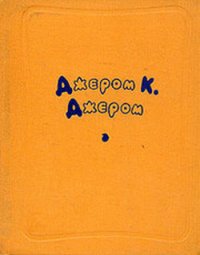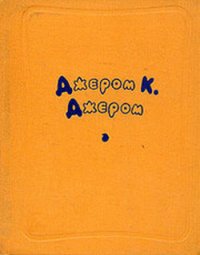My First Book - Jerome Jerome Klapka (полная версия книги txt) 📗
For instance, despite the utmost care of which I was capable while studying up for the 'Coral Island,' I fell into a blunder through ignorance in regard to a familiar fruit. I was under the impression that cocoanuts grew on their trees in the same form as that in which they are usually presented to us in grocers' windows—namely, about the size of a large fist, with three spots at one end. Learning from trustworthy books that at a certain stage of development the nut contains a delicious beverage like lemonade, I sent one of my heroes up a tree for a nut, through the shell of which he bored a hole with a penknife. It was not till long after the story was published that my own brother—who had voyaged in Southern seas—wrote to draw my attention to the fact that the cocoanut is nearly as large as a man's head, and its outer husk is over an inch thick, so that no ordinary penknife could bore to its interior! Of course I should have known this, and, perhaps, should be ashamed of my ignorance, but, somehow I'm not!

I admit that this was a slip, but such, and other slips, hardly justify the remark that some people have not hesitated to make—namely, that I have a tendency to draw the long bow. I feel almost sensitive on this point, for I have always laboured to be true to nature and to fact even in my wildest flights of fancy.
This reminds me of the remark made to myself once by a lady in reference to this same 'Coral Island.' 'There is one thing, Mr. Ballantyne,' she said, 'which I really find it hard to believe. You make one of your three boys dive into a clear pool, go to the bottom, and then, turning on his back, look up and wink and laugh at the other two.'
'No, no, not "laugh,"' said I, remonstratively.
'Well, then, you make him smile.'
'Ah! that is true, but there is a vast difference between laughing and smiling under water. But is it not singular that you should doubt the only incident in the story which I personally verify? I happened to be in lodgings at the seaside while writing that story, and, after penning the passage you refer to, I went down to the shore, pulled off my clothes, dived to the bottom, turned on my back, and, looking up, I smiled and winked.'
The lady laughed, but I have never been quite sure, from the tone of that laugh, whether it was a laugh of conviction or of unbelief. It is not improbable that my fair friend's mental constitution may have been somewhat similar to that of the old woman who declined to believe her sailor-grandson when he told her he had seen flying-fish, but at once recognised his veracity when he said he had seen the remains of Pharaoh's chariot wheels on the shores of the Red Sea.
Recognising, then, the difficulties of my position, I formed the resolution to visit—when possible—the scenes in which my stories were laid; converse with the people who, under modification, were to form the dramatis person? of the tales, and, generally, to obtain information in each case, as far as lay in my power, from the fountain-head.

Thus, when about to begin 'The Lifeboat,' I went to Ramsgate, and, for some time, was hand and glove with Jarman, the heroic coxswain of the Ramsgate boat, a lion-like as well as a lion-hearted man, who rescued hundreds of lives from the fatal Goodwin Sands during his career. In like manner, when getting up information for 'The Lighthouse,' I obtained permission from the Commissioners of Northern Lights to visit the Bell Rock Lighthouse, where I hobnobbed with the three keepers of that celebrated pillar-in-the-sea for three weeks, and read Stevenson's graphic account of the building of the structure in the library, or visitors' room, just under the lantern. I was absolutely a prisoner there during those three weeks, for no boats ever came near us, and it need scarcely be said that ships kept well out of our way. By good fortune there came on a pretty stiff gale at the time, and Stevenson's thrilling narrative was read to the tune of whistling winds and roaring seas, many of which latter sent the spray right up to the lantern and caused the building, more than once, to quiver to its foundation.
In order to do justice to 'Fighting the Flames' I careered through the streets of London on fire-engines, clad in a pea-jacket and a black leather helmet of the Salvage Corps. This to enable me to pass the cordon of police without question—though not without recognition, as was made apparent to me on one occasion at a fire by a fireman whispering confidentially, 'I know what you are, sir, you're a hamitoor!'
'Right you are,' said I, and moved away in order to change the subject.
It was a glorious experience, by the way, this galloping on fire-engines through the crowded streets. It had in it much of the excitement of the chase—possibly that of war—with the noble end in view of saving instead of destroying life! Such tearing along at headlong speed; such wild roaring of the firemen to clear the way; such frantic dashing aside of cabs, carts, 'buses, and pedestrians; such reckless courage on the part of the men, and volcanic spoutings on the part of the fires! But I must not linger. The memory of it is too enticing. 'Deep Down' took me to Cornwall, where, over two hundred fathoms beneath the green turf, and more than half a mile out under the bed of the sea, I saw the sturdy miners at work winning copper and tin from the solid rock, and acquired some knowledge of their life, sufferings, and toils.

In the land of the Vikings I shot ptarmigan, caught salmon, and gathered material for 'Erling the Bold.' A winter in Algiers made me familiar with the 'Pirate City.' I enjoyed a fortnight with the hearty inhabitants of the Gull Lightship off the Goodwin Sands; and went to the Cape of Good Hope and up into the interior of the Colony, to spy out the land and hold intercourse with 'The Settler and the Savage'—although I am bound to confess that, with regard to the latter, I talked to him only with mine eyes. I also went afloat for a short time with the fishermen of the North Sea in order to be able to do justice to 'The Young Trawler.'
To arrive still closer at the truth, and to avoid errors, I have always endeavoured to submit my proof sheets, when possible, to experts and men who knew the subjects well. Thus, Captain Shaw, late chief of the London Fire Brigade, kindly read the proofs of 'Fighting the Flames,' and prevented my getting off the rails in matters of detail, and Sir Arthur Blackwood, financial secretary to the General Post Office, obligingly did me the same favour in regard to 'Post Haste.'
One other word in conclusion. Always, while writing—whatever might be the subject of my story—I have been influenced by an undercurrent of effort and desire to direct the minds and affections of my readers towards the higher life.
'THE PREMIER AND THE PAINTER'
By I. Zangwill

AS it is scarcely two years since my name (which, I hear, is a nom de plume) appeared in print on the cover of a book, I may be suspected of professional humour when I say I do not really know which was my first book. Yet such is the fact. My literary career has been so queer that I find it not easy to write my autobibliography.
'What is a pound?' asked Sir Robert Peel in an interrogative mood futile as Pilate's. 'What is a book?' I ask, and the dictionary answers with its usual dogmatic air, 'A collection of sheets of paper, or similar material, blank, written, or printed, bound together.' At this rate my first book would be that romance of school life in two volumes, which, written in a couple of exercise books, circulated gratuitously in the schoolroom, and pleased our youthful imaginations with teacher-baiting tricks we had not the pluck to carry out in the actual. I shall always remember this story because, after making the tour of the class, it was returned to me with thanks and a new first page from which all my graces of style had evaporated. Indignant inquiry discovered the criminal—he admitted he had lost the page, and had rewritten it from memory. He pleaded that it was better written (which in one sense was true), and that none of the facts had been omitted.




